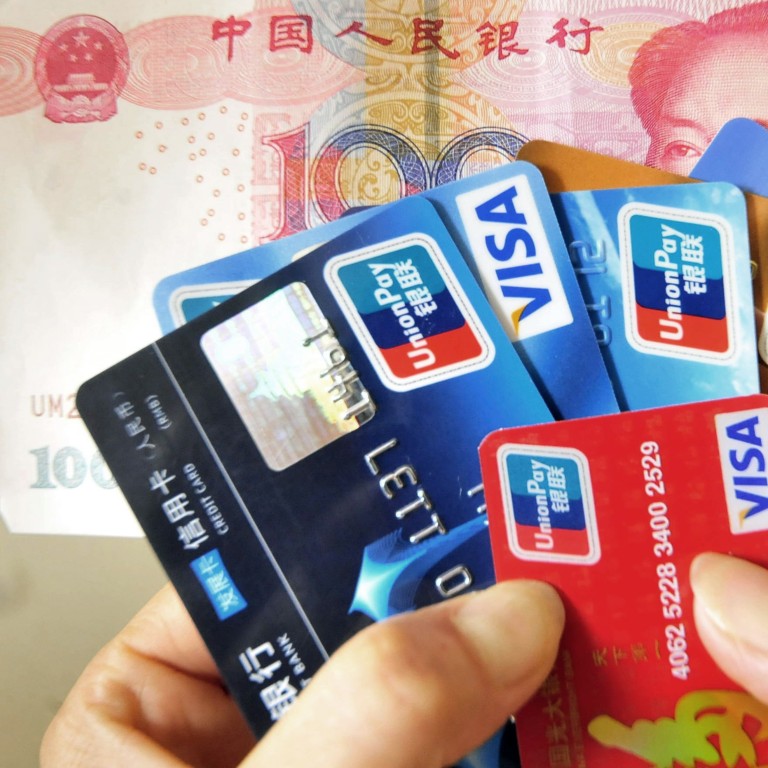
China’s central bank denies delaying Mastercard and Visa access to payments market
- China’s central bank has denied dragging its heels on opening the massive Chinese payments market to Mastercard and Visa
- The Financial Times reported that the PBOC was stalling market entry for payments giants
China’s central bank has denied reports that it is dragging its heels on opening the massive Chinese payments market to Mastercard and Visa.
While Mastercard filed an application to provide yuan payment services in 2017, the card issuer retracted the application in June 2018, an unidentified official in the People’s Bank of China (PBOC) department that licenses payment services told a Chinese financial news portal.
Visa was said to have retracted its original application in January 2018. It reapplied in April, according to wallstreetcn.com, but the central bank found that the application had “problems and required the company to provide additional documents”.
The anonymous PBOC official denied a report saying that it had not acknowledged applications from the card payment giants, which appeared in the Financial Times on Monday.
When approached for comment by the South China Morning Post, central bank press officials pointed to the wallstreet.cn report as its official stance.
Neither Mastercard nor Visa responded to requests for comment.
The delay at the central bank is typical of the sort of behaviour many foreign companies have claimed has been going on for years: China using informal barriers to block foreign competition in domestic markets, while Beijing promises, through official channels, to open those markets further.
Mastercard and Visa have long sought to enter China’s huge yuan card payments market, but Beijing has been reluctant to let them in.
Instead, in 2002, the PBOC created its own card payment network, China UnionPay. Helped by central government blessing, a financial boom and a market closed to competition, UnionPay has since become the world’s largest card issuer.
Critics point to the close links between UnionPay and the PBOC. The new chairman of UnionPay is Shao Fujun, who spent the three decades to November 2018 at the central bank.
Shao’s predecessor was Ge Huayong, another PBOC veteran who had served as chief of its international and personnel departments. Before Ge, Su Ning, a former central bank vice-governor, headed UnionPay for five years.
In 2012, the World Trade Organisation ruled in favour of the United States in a dispute with China over access to its domestic payments market. The ruling stated that China should open its domestic yuan payment services to foreign competition, but China did not make the “channel” ready until the summer of 2017.
At that point, the central bank issued a long list of requirements needed before you could become a licensed card payment service provider.
The central bank in November 2018 granted approval to a joint venture between American Express and Lianlian Group, its Chinese partner.
According to the wallstreetcn.com report, the PBOC said that it has “always been opening up China’s bank card payment services to foreign competition, to improve service through the introduction of competition”.
It said it has never intervened in commercial decisions behind applications or requested any applicant to enter a joint venture .
The PBOC has arranged the same market entrance requirements and procedures for both Chinese and foreign applicants to create a “fair competitive market environment”, it said.
The central bank has been following “open, fair and just” market-oriented principles in acknowledging and processing applications, it added.
For now, UnionPay remains the only bank card payment services provider in China, monopolising a market of about 7 billion cards – including about 600 million credit cards – and 100 billion bank card uses a year.
Consumers are also increasingly using third-party electronic payment services like Alipay and WePay, rather than traditional credit cards. Through its, QuickPass product, UnionPay is attempting to capitalise on this market and has achieved some penetration.
Meanwhile, Netsunion, a state-owned entity, has been set up to handle the clearing of online payments.

